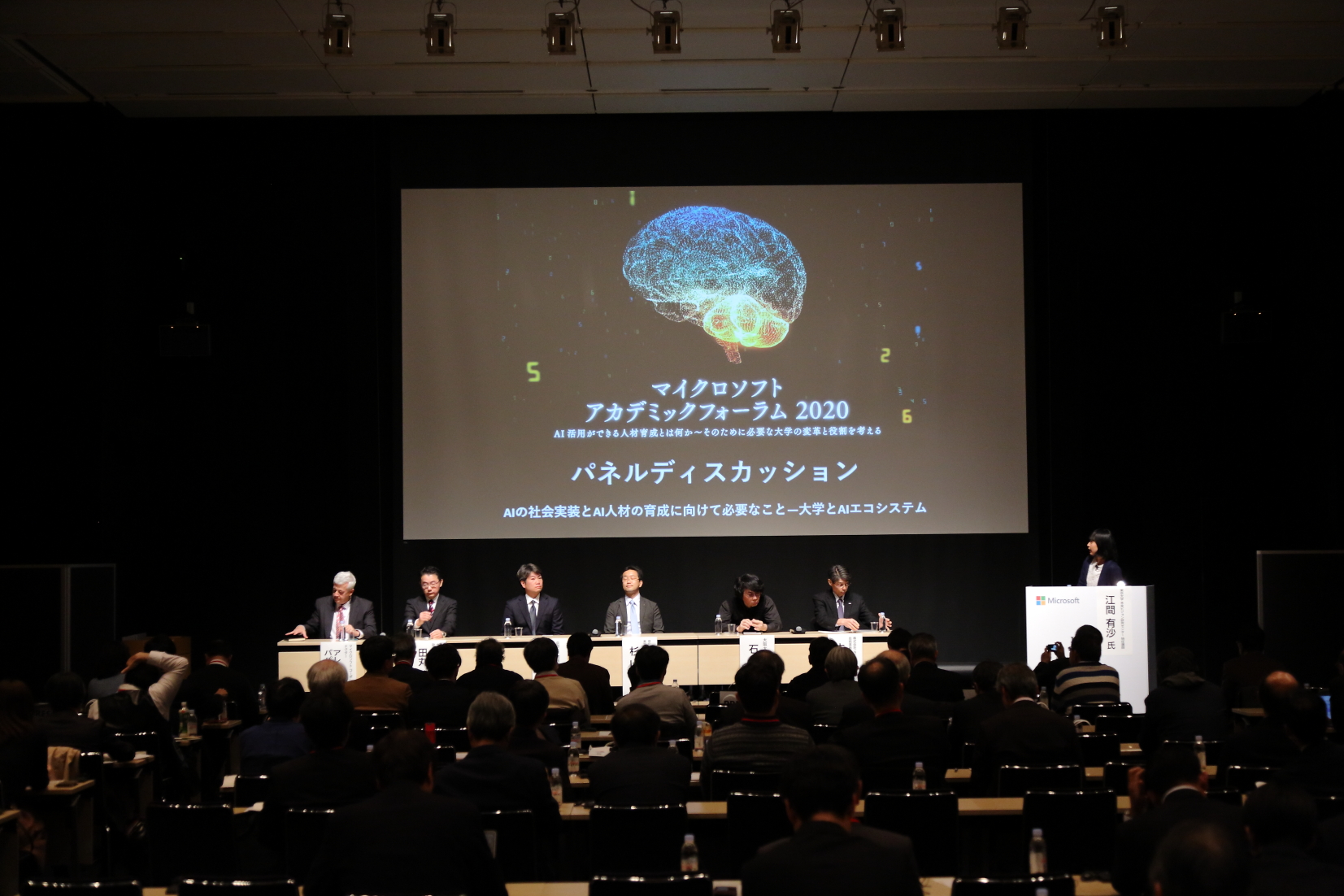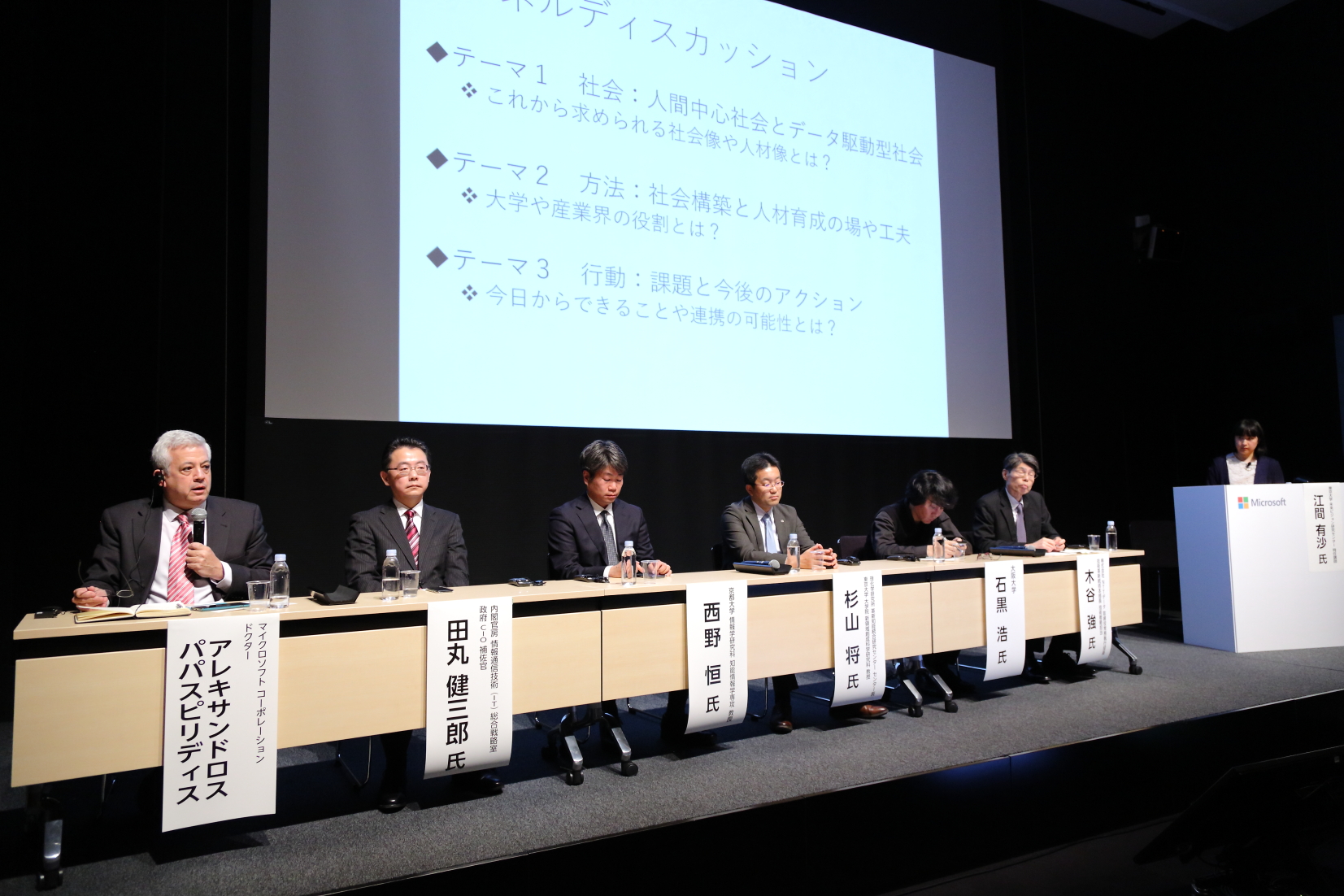AI Academic Forum 2020: Empowering people to utilize AI – discussions on roles and transformation of universities
- Date:Tue, Jan 28, 2020
- Time:13:00-18:10
- Location:Roppongi Academyhills, Roppongi Hills Mori Tower 49F
*Doors open at 12:20 - Hosted by:
Microsoft Japan Co., Ltd
- Co-Hosted by:
Institute for Future Initiatives, UTokyo
AI Data Consortium - Registration:
Please register through the website of Microsoft Japan.
*This page is provided in Japanese. - Language:
Japanese (English-Japanese Simultaneous translation will be provided with the talk of Anthony Salcito)
One of the factors behind the ongoing changes in academia, industries, public sectors, and civil society is the use of AI. However, the shortage of human resources capable of using AI has become an issue. One of the important missions of universities is to empower not only students but also people working to provide AI training education.
At the same time, Japanese universities are facing increasingly fierce competition to attract students in Japan due to the declining birthrate and aging population. And the emergence of universities overseas that offer innovative social services and fully digitized management formats has raised the barriers to acquiring students.
Under these circumstances, what role should Japanese universities play in society and what kind of new value should they create and appeal to the public?
In this event, we will deepen our discussion, including policy and educational aspects, on what kind of skills and training on AI is required both inside and outside universities And together with experts such as universities, research institutes, and government officials working at the forefront in various areas of AI, we will discuss what kind of roles and transformation should universities to take. At the same time, we introduce some of the initiatives and the latest case studies of Microsoft that are being used at universities overseas and in Japan.
Institute for Future Initiatives, UTokyo
e-mail: ifi_tg★ifi.u-tokyo.ac.jp(★→@)
On January 28, 2020, “AI Academic Forum 2020: Empowering people to utilize AI – discussions on roles and transformation of universities” was held at Roppongi Academy hills.

Photo: Microsoft Japan Company Limited
One of the factors behind the ongoing changes in academia, industries, public sectors, and civil society is the use of AI. However, the shortage of human resources capable of using AI has become an issue. One of the important missions of universities is to empower not only students but also all people to provide AI training education. Under these circumstances, what role should Japanese universities play in society and what kind of new value should they create and appeal to the public?
In this event, we deepened our discussion, including policy and educational aspects, on what kind of skills and training on AI is required both inside and outside universities And together with experts such as universities, research institutes, and government officials working at the forefront in various areas of AI, we discussed what kind of roles and transformation should universities to take.
In the first session, Alexandros Papaspyridis of Microsoft corporation talked about Microsoft’s AI research activities, AI case studies in Higher Education as well as its approach in responsible AI. Then, Noboru Koshizuka of the University of Tokyo introduced the role of the university to develop human resources who can use AI, and the technology fields to be focused. After that, Jun Hashizume of the Ministry of Education, Culture, Sports, Science and Technology talked about the trends of AI research and development policy of the Japanese government.
The second session focused to learn the forefront of AI technology. Masashi Sugiyama of the RIKEN AIP center and the University of Tokyo gave an overview of cutting-edge machine learning research and an attempt to develop human resources at the center. Ko Nishino of Kyoto University introduced technologies that will enable us to understand our environment in more detail in the field of computer vision and university recurrent education activities. Furthermore, Yoko Nakai of Microsoft Japan introduced programs and technologies that Microsoft is developing for solving social problems.
In addition to Alexandros Papaspyridis, Masashi Sugiyama and Ko Nishino, Tsuyoshi Kitani of NTT Data Corporation, Hiroshi Ishiguro of Osaka University, and Kenzaburo Tamaru of the Cabinet Secretariat were invited as panelists to hold a panel discussion entitled “To implement AI in society and develop AI human resources – universities and the AI ecosystem” hosted by Arisa Ema of the University of Tokyo. The panel covered three major themes:
Theme 1 Society: Human-centered Society and Data-driven Society – What is the future image of society and human resources?
Theme 2 Methods: Social development and human resource development: What is the role of universities and industry?
Theme 3 Activities: Issues and future actions – What can we do today and what is the possibility of collaboration?

Photo: Microsoft Japan Company Limited
Premises for discussion under Theme 1 include the “Social Principles of Human-Centric AI” released by the Cabinet Office in 2019, and the “Human-centered Future Society” which was mentioned at the G20 Digital Economy Ministers. In the panel discussion, the vision of the society’s future evolution was discussed. as decision support AI can have a major impact on people’s behavior and thinking in the near future. There was an opinion that even if a machine manages societies, we could create a system that people can feel comfortable without feeling infringement of their privacy. On the other hand, there was also an opinion that it is important to consider the ideal social image while listening to the opinions of various people because the concept of privacy changes in time and across countries. Also, AI can accelerate social fragmentation, depending on who’s can benefit from its use. For this reason, in a society where technology is advancing, students will be required to acquire knowledge of humanities and social sciences, including philosophy.
Then the discussion moved on to the second theme, methodology: how can we develop and educate such people? In companies, practical questions such as fairness and privacy protection are asked through dialogue with clients and users when providing products to society. In-house training is also conducted in order to respond to the ever-evolving technology, abuse of technologies such as deep fakes, and changes in social conditions. Discussions went on what knowledge and skills can be acquired through collaboration with universities.
Besides teaching technology, also liberal arts and critical thinking are necessary to deeply understand society and people and master the effects of AI systems. It is required not only for teenagers and those in the twenties but also for people who are currently at the forefront of society. As theme 3, the panel discussed concrete actions that can be taken especially focused on continuing education, which provides opportunities for members of society to be current with developments. In Japan, as we are an aging society, people in their 40’s and 50’s are important for the immediate workforce. In order to empower people to utilize AI, it is necessary to increase opportunities to acquire new knowledge and diversity through cooperation among universities, industry and policymakers. On the other hand, each country has its own system and culture and learn from international experience. It is important to design industry-academia-government collaboration that reflects the Japanese social conditions and corporate/university cultures.
This event was a half-day event from 1 pm to nearly 6 pm, with over 200 people participated. This is a topic of great interest, and it was an opportunity for organizers and panelists to realize that collaboration among academia, industry, and the government to empower people to use AI and therefore would like to continue this dialogue.
Written by Arisa Ema, Institute for Future Initiatives, The University of Tokyo